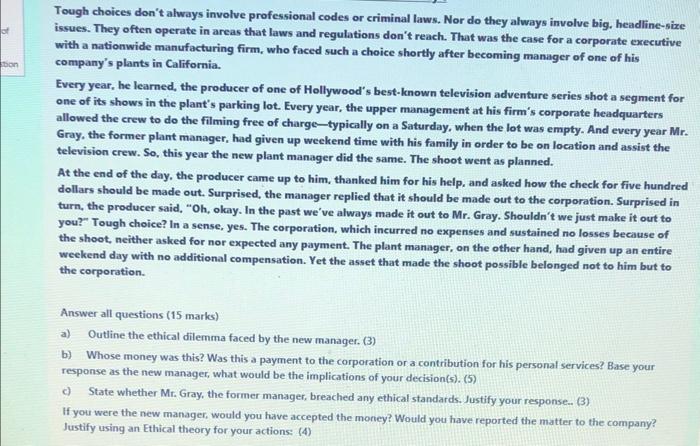Tough choices don't always involve professional codes or criminal laws. Nor do they always involve big. headline-size issues. They often operate in areas that laws and regulations don't reach. That was the case for a corporate executive with a nationwide manufacturing firm, who faced such a choice shortly after becoming manager of one of his company's plants in California. Every year, he learned, the producer of one of Hollywood's best-known television adventure series shot a segment for one of its shows in the plant's parking lot. Every year, the upper management at his firm's corporate headquarters allowed the crew to do the filming free of charge-typically on a Saturday, when the lot was empty. And every year Mr. Gray, the former plant manager, had given up weekend time with his family in order to be on location and assist the television crew. So, this year the new plant manager did the same. The shoot went as planned. At the end of the day, the producer came up to him, thanked him for his help, and asked how the check for five hundred dollars should be made out. Surprised, the manager replied that it should be made out to the corporation. Surprised in turn, the producer said. "Oh, okay. In the past we've always made it out to Mr. Gray. Shouldn't we just make it out to you? Tough choice? In a sense, yes. The corporation, which incurred no expenses and sustained no losses because of the shoot, neither asked for nor expected any payment. The plant manager, on the other hand, had given up an entire weekend day with no additional compensation. Yet the asset that made the shoot possible belonged not to him but to the corporation. Answer all questions ( 15 marks) a) Outline the ethical dilemma faced by the new manager. (3) b) Whose money was this? Was this a payment to the corporation or a contribution for his personal services? Base your response as the new manager, what would be the implications of your decision(s). (5) c) State whether Mr. Gray, the former manager, breached any ethical standards. Justify your response.. (3) If you were the new manager, would you have accepted the money? Would you have reported the matter to the company? Justify using an Ethical theory for your actions: (4)







